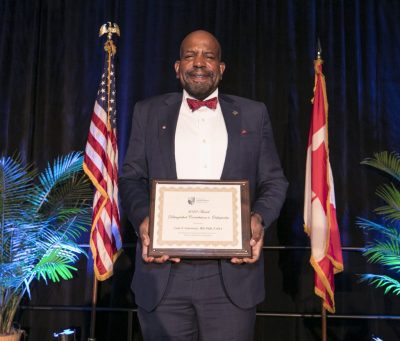from UConn Today

Dr. Cato T. Laurencin, University Professor at the University of Connecticut, has been honored by the American Orthopaedic Association (AOA) with its Distinguished Contributions to Orthopaedics Award adding him to its AOA Award Hall of Fame.
Laurencin, the Albert and Wilda Van Dusen Distinguished Professor of Orthopaedic Surgery at UConn School of Medicine, was selected for the special recognition by his AOA member peers for his remarkable personal achievement and contributions to orthopaedic surgery.
He accepted the award the evening of June 15 at the AOA’s Annual Leadership Meeting at the Rhode Island Convention Center in Providence. “I am so honored to accept the American Orthopaedic Association Distinguished Contributions to Orthopaedics Award and be recognized in the AOA Awards Hall of Fame. I feel so fortunate to be an orthopaedic surgeon.”
The AOA Distinguished Contributions to Orthopaedics (DCO) Award recognizes Laurencin for his personal achievement and broad contribution to the orthopaedic specialty, leadership, impact on patient care, and clinical and basic science research. The mission of the AOA is engaging the orthopaedic community to develop leaders, strategies and resources to guide the future of musculoskeletal care.
In addition to being a practicing sports medicine and shoulder surgeon consistently named to America’s Top Doctors list, Laurencin is a world-renowned surgeon-engineer-scientist and a pioneer of the field of regenerative engineering.
In fact, Laurencin is leading the first international effort ever for knee and limb engineering with his Hartford Engineering a Limb (HEAL) project which aims at regenerating a human limb by 2030. The National Institutes of Health and the National Science Foundation currently fund this research work through Laurencin’s large grant awards including the NIH Director’s Pioneer Grant Award and the National Science Foundation’s Emerging Frontiers in Research and Innovation Grant Award.
In orthopaedic surgery, Laurencin has been the first to win the “trifecta” of orthopaedic research lifetime awards: the Nicolas Andry Award from the Association of Bone and Joint Surgeons, the Marshall R. Urist Award from the Orthopaedic Research Society, and the Kappa Delta Award from the American Academy of Orthopaedic Surgeons.
Nationally, Laurencin is the first surgeon in history to be elected to all four national academies: the National Academy of Sciences, the National Academy of Engineering, the National Academy of Medicine, and the National Academy of Inventors. He is an elected fellow of the American Academy of Arts and Sciences and an elected fellow of the American Association for the Advancement of Science.
Laurencin is a laureate of the National Medal of Technology and Innovation, America’s highest honor for technological achievement, awarded by President Barack Obama at the White House. He is the recipient of the prestigious Spingarn Medal, the highest honor of the NAACP bestowed upon such Americans as Martin Luther King Jr., Maya Angelou, George Washington Carver, Jackie Robinson, and Duke Ellington.
At UConn Laurencin is also a professor of chemical engineering, materials science and engineering, and biomedical engineering and serves as CEO of The Connecticut Convergence Institute for Translation in Regenerative Engineering. He has received the highest honors in engineering, medicine and science, including the Philip Hauge Abelson Prize given for “signal contributions to the advancement of science in the United States.” The American Institute of Chemical Engineers recently established the Cato T. Laurencin Regenerative Engineering Founder’s Award in honor of his breakthrough achievements in that field.
Laurencin received his BSE in chemical engineering from Princeton University, his MD, magna cum laude from the Harvard Medical School, and his Ph.D. in biochemical engineering/biotechnology from the Massachusetts Institute of Technology.